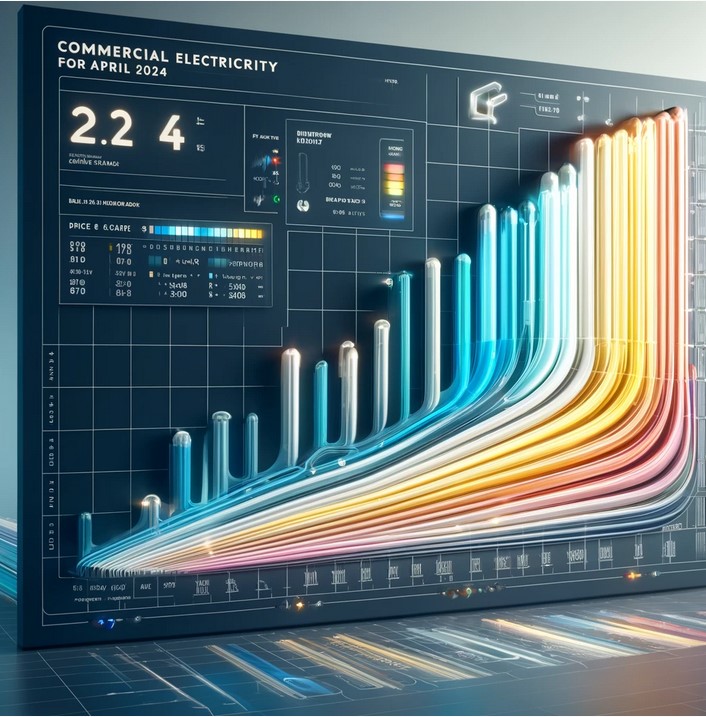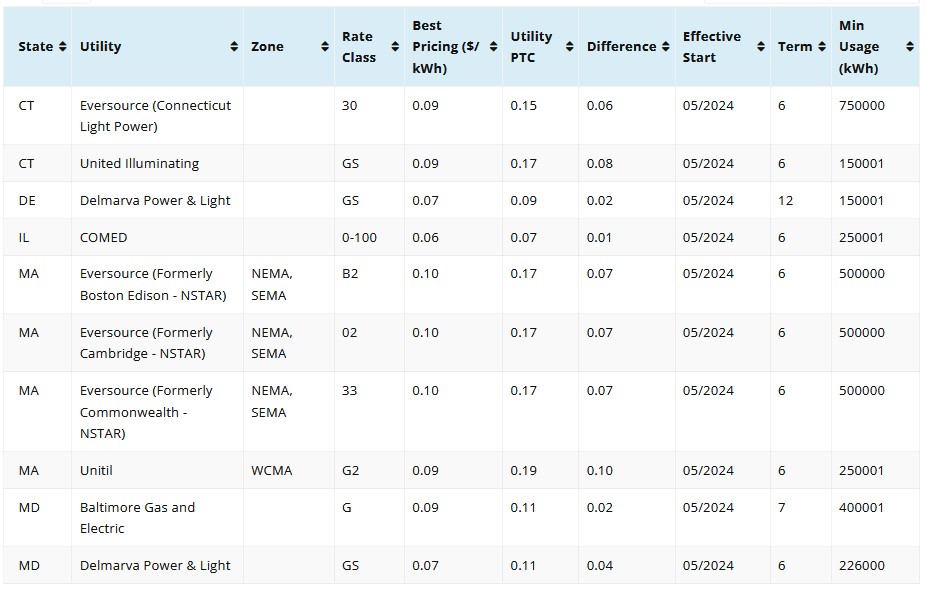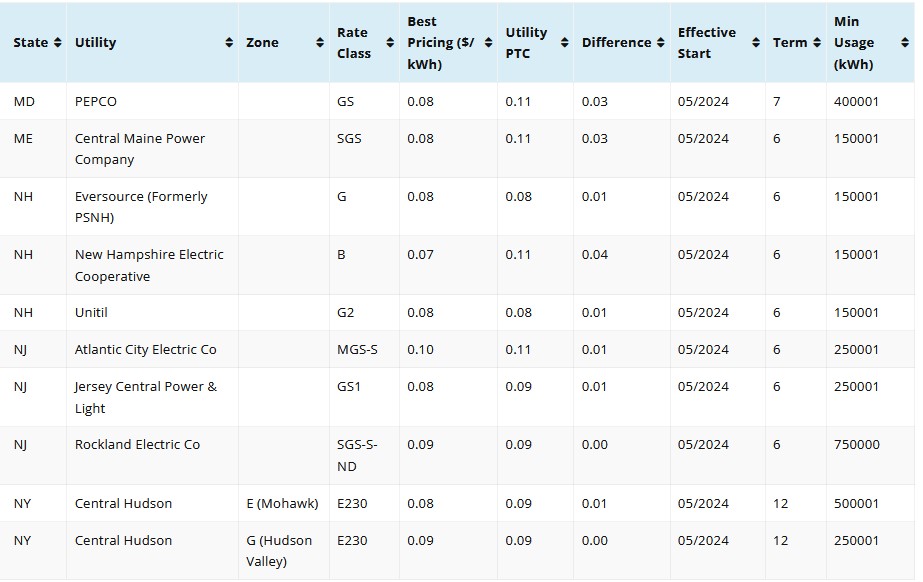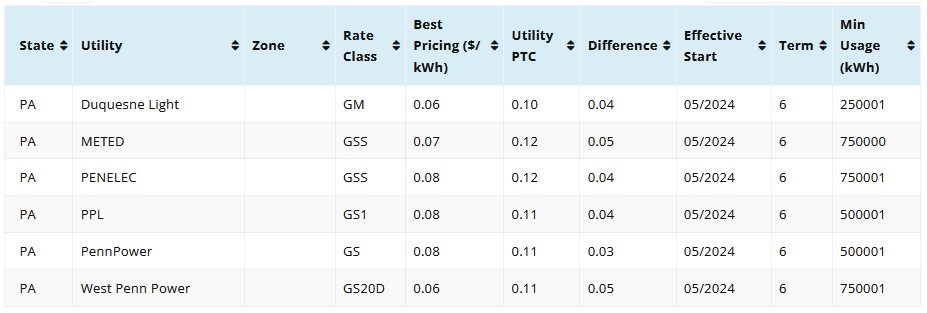April 2024 Commercial Electricity Rates

Understanding Commercial Electricity Pricing For April 2024
As April 2024 unfolds, businesses across the nation are keenly observing the fluctuations in commercial electricity pricing, a critical factor that significantly impacts their operational costs and bottom line. Today we delve into the current trends in commercial electricity pricing for April 2024, shedding light on the factors influencing these dynamics and providing insights for businesses to navigate this landscape effectively.
Current Trends in Commercial Electricity Pricing
In April 2024, commercial electricity pricing is characterized by a combination of factors that influence supply and demand dynamics:
Market Demand: The demand for electricity in commercial sectors varies depending on factors such as economic activity, weather conditions, and industrial production. In April, businesses may experience increased demand due to seasonal factors, such as warmer weather leading to higher air conditioning usage.
Energy Supply: The availability of energy sources, including natural gas, coal, and renewable energy, plays a crucial role in determining electricity pricing. Fluctuations in supply, such as disruptions in fuel production or distribution, can impact pricing levels.
Regulatory Changes: Changes in energy regulations and policies at the federal, state, or local levels can influence electricity pricing. For instance, incentives for renewable energy adoption or carbon pricing mechanisms may affect the cost structure of electricity generation.
Market Dynamics: Commercial electricity pricing is also influenced by market dynamics, including competition among electricity providers, changes in wholesale electricity markets, and geopolitical factors affecting energy markets.



Understanding Commercial Energy Suppliers: A Guide for Businesses
In today's competitive business landscape, managing energy consumption efficiently is crucial for companies to maintain cost-effectiveness and sustainability. Commercial energy suppliers play a vital role in providing businesses with the energy they need to operate smoothly. But what exactly is a commercial energy supplier, and how can businesses benefit from their services?
What is a Commercial Energy Supplier?
A commercial energy supplier is a company that provides energy services and solutions tailored specifically to the needs of businesses and organizations. These suppliers offer electricity, natural gas, and other forms of energy to commercial customers, ensuring reliable and uninterrupted energy supply to support various business operations.
How Can Businesses Use Commercial Energy Suppliers?
Businesses can leverage the services of commercial energy suppliers in several ways:
Cost Savings: Commercial energy suppliers often offer competitive pricing and customizable energy plans tailored to the specific needs of businesses. By choosing the right supplier, businesses can reduce energy costs and improve their bottom line.
Energy Efficiency: Many commercial energy suppliers offer energy efficiency solutions and renewable energy options to help businesses reduce their carbon footprint and comply with environmental regulations. These solutions may include energy audits, energy-efficient equipment, and renewable energy sources such as solar or wind power.
Reliable Supply: Commercial energy suppliers ensure a reliable and uninterrupted energy supply, minimizing downtime and disruptions to business operations. With access to advanced infrastructure and technology, these suppliers can meet the energy demands of businesses of all sizes, from small enterprises to large corporations.
What Do Commercial Energy Suppliers Do?
Commercial energy suppliers perform the following key functions:
Energy Procurement: They procure energy from various sources, including power plants, natural gas suppliers, and renewable energy providers, to meet the needs of their commercial customers.
Energy Distribution: Commercial energy suppliers distribute energy through the existing infrastructure, including power lines, pipelines, and distribution networks, ensuring that businesses receive a steady supply of electricity, natural gas, or other forms of energy.
Customer Support: They provide customer support services to address inquiries, resolve issues, and assist businesses in managing their energy consumption effectively. This may include billing support, account management, and energy-saving tips.
Examples of Commercial Energy Suppliers Use
Many businesses across different industries rely on commercial energy suppliers for their energy needs. Some examples include:
Manufacturing Facilities: Manufacturing companies require a significant amount of energy to power their operations, including machinery, equipment, and lighting. Commercial energy suppliers help these businesses optimize their energy usage and minimize costs.
Retail Stores: Retailers depend on energy to power their stores, lighting, heating, and cooling systems. By partnering with commercial energy suppliers, retail businesses can ensure a reliable and cost-effective energy supply to support their daily operations.
Office Buildings: Office buildings consume energy for lighting, HVAC systems, computers, and other electrical appliances. Commercial energy suppliers offer energy-efficient solutions and customized energy plans to help office buildings reduce energy waste and save money.

How to Contact Commercial Energy Suppliers
To inquire about commercial energy services or request a quote, businesses can contact commercial energy suppliers directly. At Bid On Energy we compare most energy suppliers for you 302-360-8110. By reaching out to them, businesses can explore their energy solutions and discuss their specific requirements with experienced professionals.
Today commercial energy suppliers play a crucial role in meeting the energy needs of businesses across various industries. By partnering with these suppliers, businesses can benefit from cost savings, energy efficiency, and reliable energy supply, ultimately enhancing their competitiveness and sustainability in the marketplace.
CHECK APRIL COMMERCIAL ELECTRICITY RATES - CLICK HERE
